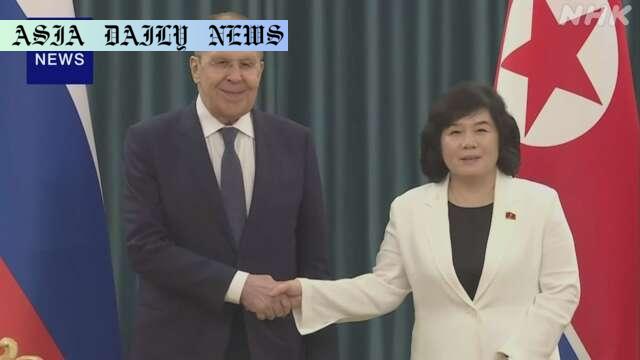North Korea: Russia understands reasons for pursuing nuclear development per Lavrov during high-level talks.
- Russia respects North Korea’s nuclear ambitions, per Lavrov.
- Pyongyang commits full support to Russia’s policies internationally.
- Russian and North Korean leaders maintain ongoing communication.
- Future Russia-North Korea summits are under arrangement.

Strengthening Russia-North Korea Alliance through Military Cooperation
Amid growing international tensions, the relationship between Russia and North Korea serves as an example of mutual strategic alignment. During his recent visit to Wonsan, North Korea, Russian Foreign Minister Sergey Lavrov underscored Moscow’s respect for North Korea’s pursuit of nuclear development. This partnership signals a pivot for both nations, navigating through geopolitical complexities while countering increasing pressures from the United States and allied states like Japan and South Korea. Lavrov’s acknowledgment reflects a calculated diplomatic maneuver, emphasizing Russia’s recognition of North Korea’s perceived defense-driven motives in their nuclear agenda.
The meeting featured reciprocal military acknowledgments, with Lavrov expressing gratitude towards North Korean forces that reportedly contributed to suppressing Ukrainian incursions into the Russian region of Kursk. Simultaneously, North Korea reiterated its commitment to unconditional support of Russian defense objectives, further solidifying military ties.
This alliance, underpinned by collaborative treaties for mutual defense assistance, delineates a clear message to oppositional forces: Russia and North Korea intend to stand resilient in the face of perceived adversarial coalitions. The strategic partnership elevates North Korea’s standing as both an ally and asset to Russia’s broader defense-oriented agendas.
Geopolitical Implications of a Russia-North Korea Nuclear Cooperation
Internationally, the reaffirmation of North Korea’s nuclear ambitions, supported tacitly by Russia, carries significant implications. Lavrov’s statements depict an evolving global narrative, where nuclear-armed states continue to challenge prevailing non-proliferation efforts. By justifying North Korea’s nuclear pursuits, Russia questions the role of collective defense coalitions such as that led by the United States. This tangible shift in bilateral support creates a delicate balance of power across the Asian region.
Russia’s overt endorsement also reflects broader geopolitical ambitions, empowering states like North Korea to act assertively against perceived coercions. For Pyongyang, Russia presents an indispensable ally in mitigating international criticisms over its contentious nuclear program. This shared outlook strengthens its demeanor amidst demanding denuclearization narratives from countries like South Korea and the U.S.
Furthermore, Lavrov’s discourse highlights an intent to deter external forces from exploiting alliances to isolate either country. This move signals a reinforced axis of resistance, potentially leading to redefined security thresholds across the region. Both countries perceive nuclear deterrence as vital to their sovereignty and defense integrity against increasing economic sanctions and political pressures.
Future Summits Marking Collaborative Expansion
The diplomatic convergence between Moscow and Pyongyang also paves the path for high-level engagements, notably between Russian President Vladimir Putin and North Korean leader Kim Jong Un. Lavrov’s confirmation of ongoing communications and summit preparations underscores the trajectory towards intensified bilateral cooperation. These meetings are anticipated to address large-scale strategic expansions, ranging from military collaborations to economic alignments.
Given the trilateral dynamics among U.S.-aligned coalitions countering China-supported alliances, the summit’s anticipated outcomes could redefine power hierarchies in the Asia-Pacific region. Both leaders are in strong agreement on prioritizing mutual resilience. This arrangement will likely shape overarching global strategies concerning national security, international trade amidst sanctions, and counteractions to growing Western influence.
While the timeline remains fluid, the prospective summit could consolidate actionable frameworks fostering long-term solidarity. This union, leveraging Russia’s clout and North Korea’s perceived angular defiance, further positions the duo as a formidable geo-strategic bloc.



Commentary
The Growing Importance of Strategic Alliances
The collaboration between Russia and North Korea underscores how global alliances evolve under pressure from shifting geopolitics. For Russia, forging closer ties with Pyongyang serves as an opportunity to consolidate influence amidst escalating tensions with Western powers. By openly respecting North Korea’s nuclear ambitions, Moscow attempts to reframe one of the most polarized narratives in modern diplomacy. This is both a strategic and symbolic maneuver, affirming solidarity with its allies.
Such a partnership transcends conventional diplomacy by adding layers of military and strategic bonding. Lavrov’s gratitude towards North Korean troops fighting alongside Russian forces in Ukraine exemplifies this expanded cooperation. This acknowledgment could further intensify global criticisms but also showcases Russia’s openness to a resourceful exchange with aligned nations.
Global Repercussions and Regional Balancing
The repercussions of this growing partnership align squarely with ongoing power struggles in the Asia-Pacific. The U.S.-Japan-South Korea alignment may face challenges in trying to strategically outmaneuver the strengthened coalition of Russia and North Korea. With North Korea now bolstered by Russia’s overt backing and promises for contingency-based military aid, the threat perception and actual posturing amongst adversaries will likely increase.
This realignment highlights the potential for worldwide destabilization if diplomatic efforts for peace and negotiations falter. Polarized alliances breed intense suspicion, driving further mistrust between nations.
Looking Ahead at the Summit
The forthcoming summit between Kim Jong Un and Vladimir Putin showcases the potential for even greater cooperation. These meetings will be critical to determining whether this bilateral relationship is set to evolve into a fully integrated alliance or remain primarily an agreement of convenience. Both leaders are likely to prioritize strategies that counter unilateral pressures stemming from Western coalitions.
To accurately gauge the outcomes of such summits, it’s imperative to consider the economic reinforcements and arms trade that may define Russia-North Korea relations. Amidst the uncertainty, one thing remains clear—this partnership continues to reshape the narrative of global power balances in profound ways.